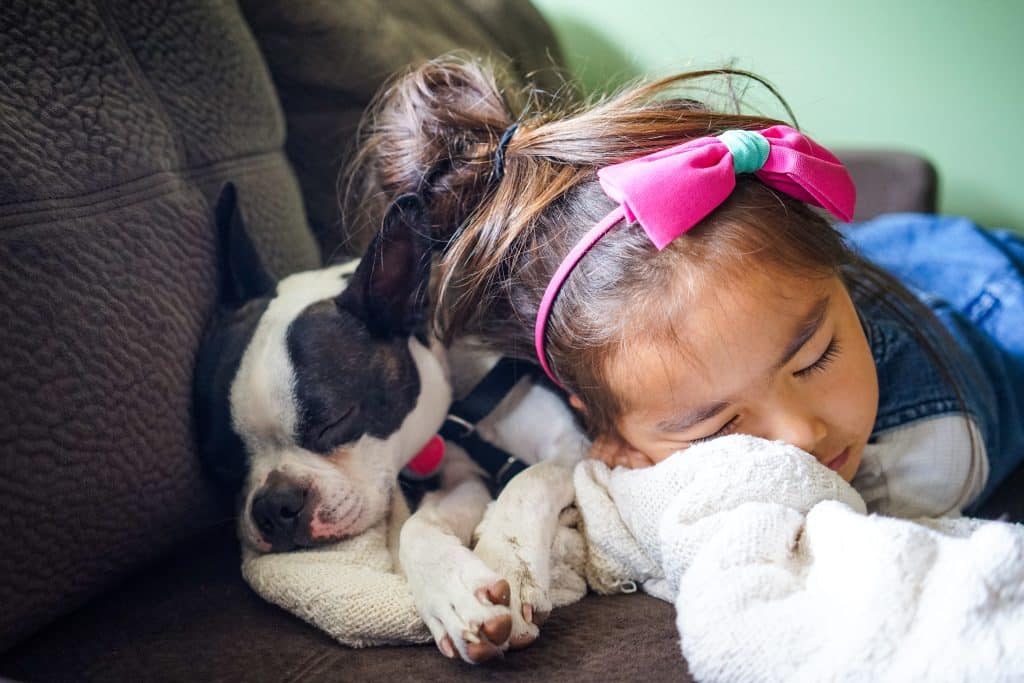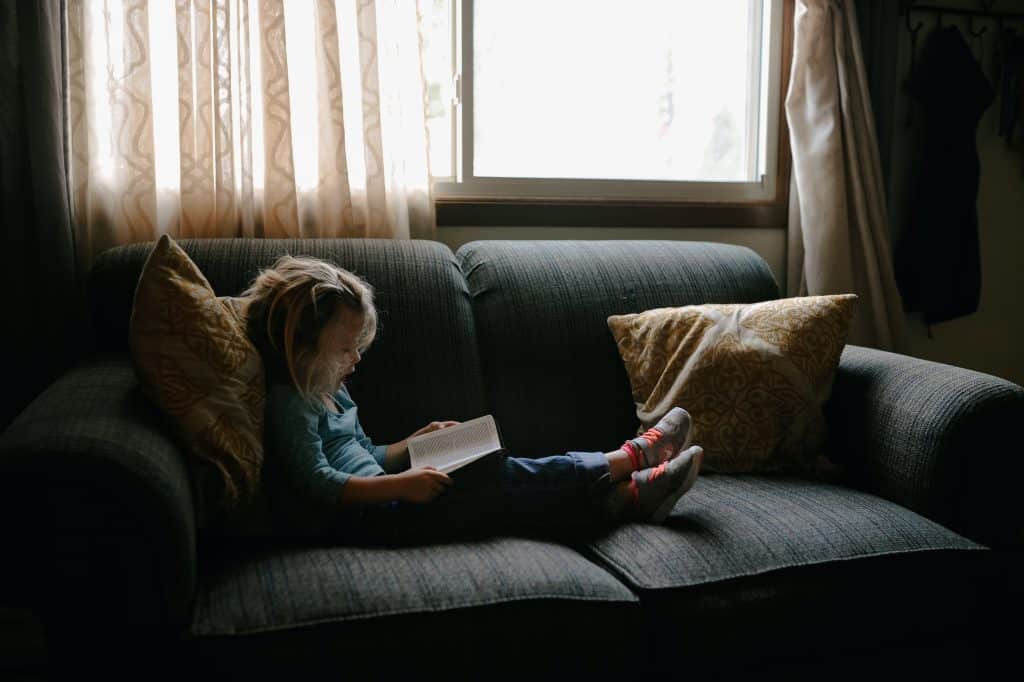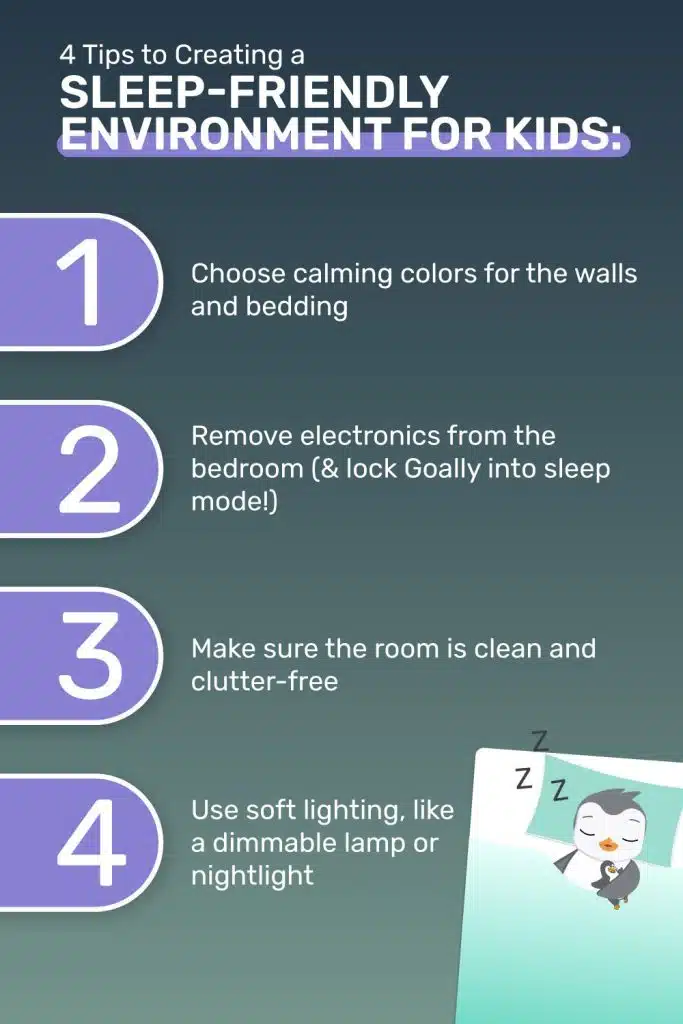Are you tired of counting sheep in a futile attempt to lull your neurodivergent child to sleep? Sleep problems are reported in an estimated 25%–50% of individuals who have ADHD. If ADHD trouble sleeping is a nightly battle in your household, you’re not alone. But fret not—our list of proven strategies will transform bedtime from a nightmare into a sweet dream. Designed specifically for caregivers and parents of kids with thinking and learning differences, our tips will help your little one get the rest they deserve. Buckle up because we’re about to go on a journey to peaceful slumber and a well-rested tomorrow with the help of Goally.
Table of Contents
Create a Consistent Bedtime Routine
If your little one is grappling with ADHD and having trouble sleeping, establishing a cozy bedtime routine can work wonders. Think about creating a soothing wind-down pattern that signals it’s snooze time. It may start with a snuggly warm bath, followed by a massage or that favorite bedtime story they can’t get enough of. Remember, the secret sauce here is consistency. Following the same actions in the same order, every night is like sending a personalized sleep invitation to your kiddo’s brain.
And guess what? Goally’s learning tablet for kids can be your superhero sidekick in this bedtime battle. This tablet is not just another tech gadget—it’s a tried-and-true tool that can help reinforce this vital routine, making it a tad bit easier for your restless little star to drift off into dreamland. So, if ADHD trouble sleeping is throwing a wrench in your child’s – and your – restful nights, let’s take the bedtime routine route, shall we?
Design a Sleep-Friendly Environment
Creating a cozy, clutter-free sleep sanctuary is essential for your child. Invest in comfortable bedding, blackout curtains, and a white noise machine to block out external distractions. Keep the room cool, ideally around 65°F, to encourage relaxation. Don’t forget to banish electronic devices from the bedroom, as the blue light they emit can interfere with sleep.

Read More: How to Put a Kid to Sleep in 40 Seconds
Encourage Relaxation Techniques
Help your child develop relaxation skills to combat ADHD-related sleep issues. Relaxation techniques can help your ADHD child who has trouble sleeping.
- Develop Relaxation Skills: Empower your child to fight off ADHD trouble sleeping with the skill of relaxation. Techniques like deep breathing exercises, progressive muscle relaxation, and guided imagery can be hugely beneficial.
- Introduce at Bedtime: Introduce these relaxation methods during the wind-down time before sleep. This will help your child associate these techniques with the process of falling asleep.
- Encourage Independent Practice: Encourage your little one to independently practice these techniques. The more familiar they are, the more effective they will become.
- Utilize Goally Apps: Leverage the power of Goally’s tailored apps focused on relaxation and mindfulness. These apps can be a handy tool to introduce and reinforce these sleep-friendly habits, easing your child’s ADHD trouble sleeping.
Introduce these methods during bedtime and encourage your child to practice them independently, using Goally apps tailored to relaxation and mindfulness.
Limit Stimulating Activities Before Bed
Avoid exposing your child to stimulating activities or content at least one hour before bedtime. Replace video games and action-packed TV shows with calming activities like puzzles, coloring, or listening to soothing music. This will help their brain transition smoothly into sleep mode.

Read More: How to Calm an Overstimulated Toddler
Monitor Food and Drink Intake
Let’s talk about food, parents, especially those evening meals and snack time decisions. Is your kiddo having a tough time snoozing because of ADHD trouble sleeping? You should take a closer look at their plate. Keep a keen eye out for those sugary, bouncy-energy foods and anything caffeinated that could make those z’s elusive.
Instead, consider filling their plate (or snack bowl) with sleep-friendly fare. Cherries, bananas, or even a classic glass of warm milk could do the trick. And remember, timing is everything! Try nudging dinner a little earlier to sidestep any late-night indigestion dramas disrupting your child’s sleep. Small changes can make a big difference when taming ADHD trouble sleeping!
Consult a Professional If Your ADHD Child Still Has Trouble Sleeping
If your child continues to experience sleep problems despite your diligent efforts, it’s advisable to seek assistance from a qualified professional. Reach out to your pediatrician or a sleep specialist to investigate potential underlying sleep disorders or medication-related side effects. They may propose a sleep study or provide additional behavioral strategies tailored to address the specific sleep-related challenges of your child with ADHD.
Establish a Sleep Schedule
Consistency doesn’t stop at bedtime routines—maintaining regular sleep and wake times will help regulate your child’s internal clock. Aim for the same bedtime and wake-up time every day, even on weekends. This consistency will eventually make it easier for your neurodivergent kid to drift off to sleep and wake up refreshed.
Encourage Physical Activity
Daily exercise can have a significant impact on your child’s sleep quality. Encourage outdoor play or structured sports activities to help them burn off excess energy. However, avoid vigorous exercise right before bedtime, as it can have the opposite effect and make it more difficult for your adhd child to fall asleep and create trouble sleeping.
Offer Comfort Items
Sometimes, all a child needs is a little comfort to ease their anxiety and help them sleep. Provide a favorite stuffed animal, a soft blanket, or even a special pillow that brings them a sense of security. These comfort items can also help create positive associations with bedtime.
Empower Your Child
Empower your child by involving them in creating their own sleep strategies. Collaborate on a bedtime routine, let them choose the relaxation techniques they enjoy, and encourage them to take ownership of their sleep environment. This sense of control can work wonders for overcoming ADHD trouble sleeping.

Try Goally For Your Child With ADHD
Goally is an excellent option for many families that have a child with ADHD. Use game play as a points-based motivator for your kiddo with ADHD, help them learn emotional regulation skills, and watch them grow! It’s simple to set up and has an expert-informed design.
To wrap it up, tackling ADHD trouble sleeping doesn’t have to feel like an uphill battle. By employing these proven strategies, you’ll set the stage for your neurodivergent child to enjoy restful slumber and wake up ready to conquer the world! Keep experimenting and refining your approach because every child is unique, and what works for one might not work for another. With a little patience, persistence, love, and the support of Goally’s resources, you’ll help your little one unlock the magic of a good night’s sleep. Here’s to brighter, well-rested mornings and a future filled with sweet dreams!
FAQs About ADHD Trouble Sleeping
What can help a child with ADHD trouble sleeping? Creating a consistent bedtime routine, incorporating relaxation techniques, and controlling dietary habits can significantly help a child with ADHD trouble sleeping.
Can Goally's learning tablet help with ADHD trouble sleeping? Yes, Goally's learning tablet offers features that reinforce healthy sleep habits, making it a valuable tool for combating ADHD trouble sleeping.
Does diet affect ADHD trouble sleeping? Yes, limiting sugary foods and caffeinated beverages while including sleep-promoting foods in the diet can improve sleep quality in children with ADHD.
Can relaxation techniques assist in managing ADHD trouble sleeping? Absolutely! Techniques like deep breathing, progressive muscle relaxation, and guided imagery can effectively help a child with ADHD improve their sleep.
Is there a connection between an early dinner schedule and reducing ADHD trouble sleeping? An early dinner can help avoid late-night indigestion, often improving sleep quality in children with ADHD trouble sleeping.
This post was originally published on 04/07/2023. It was updated on 04/17/2024.

Goally
We help parents teach their kids life skills, like doing bedtime and morning independently. Backed by science, we incorporate evidence-based practices and expert-informed designs in all of our apps and content.






